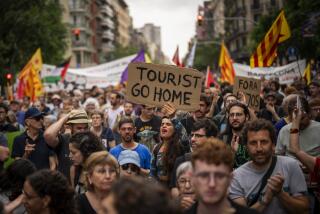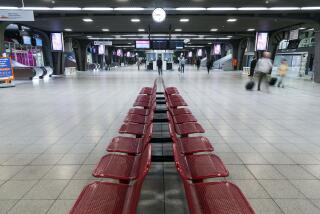Amsterdam Cracks Down on Hard Drugs : Netherlands, in Shift of Policy, Steps Up Enforcement of Laws
- Share via
AMSTERDAM — Uncomfortable with its reputation as a country that is soft on drug users, the Netherlands has moved toward tighter enforcement of laws to combat trafficking and discourage young tourists from coming here in search of a trouble-free high.
The trend toward more vigorous law enforcement against drug dealers has come partly in response to concern from neighboring European countries, Dutch officials said. It also has coincided with a shift in public opinion leading some Dutch to question the attitude that has made the Netherlands a champion of dealing with drug use as a social problem as much as a crime.
Despite the tightening, Dutch authorities have continued to tolerate illegal sales and use of soft drugs such as marijuana and hashish in the dark coffeehouses that line Amsterdam’s canals. This is in line with a decade-old policy drawing a sharp distinction between offenses involving the use of hard drugs, which is prosecuted, and soft drugs, which are permitted in practice although barred by law.
Specialists in the Netherlands said this policy, which has helped make the city famous among young travelers, also has limited the bad effects of soft drugs by sparing youths the need to deal with criminals and addicts to experiment with marijuana. A survey commissioned by Amsterdam’s city government showed that proportionately far fewer youths have tried cocaine--or even marijuana--in the Netherlands than in the United States.
Monte Aart Alexander van Capelle, a public prosecutor directing the anti-drug effort under Justice Minister Frits Korthals Altes, said police have stepped up enforcement of laws and guidelines without abandoning the overall policy of tolerance on soft drugs and their users and compassion for hard-drug addicts.
“But we are screwing it down a bit,” he explained in an interview.
The result in the soft-drug field has been strengthened enforcement of police rules designed to keep marijuana sales small-scale and discreet and to prevent formation of big distribution networks.
More than 200 coffeehouses in Amsterdam and scores more in other cities still purvey soft drugs. But their owners have been put on notice to stop calling attention to their wares, dealing in carry-out quantities or selling cocaine and heroin under the counter.
Police have ordered coffeehouses to take down price lists previously posted in windows and on sidewalk signs.
Korthals Altes, the justice minister, recently suggested in Parliament that the Netherlands also should consider banning foreigners from buying soft drugs in the country’s coffeehouses.
The idea drew criticism as discrimination not in keeping with the Netherlands’ reputation for openness to tourists and other foreigners. But Van Capelle said guidelines to this effect already have been drafted and the minister made his comments to test public opinion.
“We like the reputation of being tolerant but not the reputation of being soft,” said Walter Etty, an Amsterdam alderman who has taken a special interest in the city’s drug problems.
Under a 4-year-old agreement with West Germany, German hard-drug users who commit crimes in the Netherlands are refused methadone treatment here and turned over to West German border police.
Methadone treatment has long been part of an extensive government program to nurse Dutch heroin addicts into as normal a life as possible. Piet de Ruijter, Etty’s executive assistant for hard drugs, said 70% of the country’s approximately 6,500 addicts come into contact with the program at least periodically.
Heroin long has been readily available in the Netherlands. Rotterdam, the world’s busiest port, receives 2.5 million cargo containers a year as potential caches. Van Capelle said the port began using a computerized container-tracing system at the beginning of the year to make smuggling of both hard and soft drugs more difficult.
More to Read
Sign up for Essential California
The most important California stories and recommendations in your inbox every morning.
You may occasionally receive promotional content from the Los Angeles Times.













